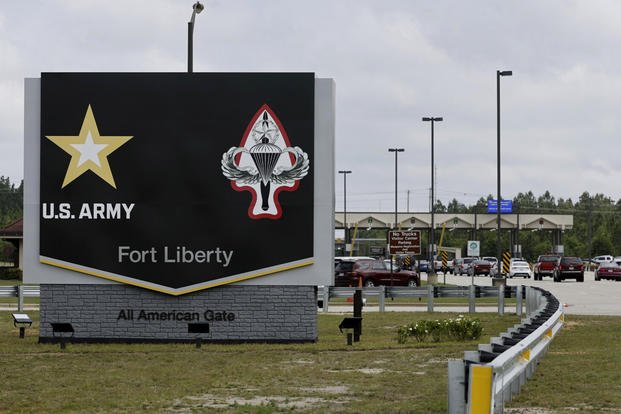Fort Liberty in North Carolina could revert to its former name honoring an unsuccessful Confederate general if former President Donald Trump is reelected in November.
At a campaign event in Fayetteville on Friday evening, Trump vowed to bring back the name Fort Bragg, which was changed to Fort Liberty last year as part of a broader congressionally mandated project to scrub Confederate names from Defense Department property.
"I think I just learned the secret to winning absolutely and by massive margins. I'm going to promise to you, as I said at the beginning, that we're going to change the name back to Fort Bragg," Trump said at the town-hall style event.
Read Next: 54 Job Types Down to 10? Air Force's Top Enlisted Leader Looks to Merge Maintenance Specialties
The comment came after an attendee who asked a question identified himself as an active-duty soldier from Fort Liberty, eliciting boos from the crowd.
Fort Liberty was one of nine Army bases that had their names changed last year to drop references honoring military leaders of the Confederacy, which waged war against the U.S. to preserve the institution of slavery.
The name changes were mandated by the 2020 version of the annual defense policy bill, which Congress wrote amid a nationwide reckoning over race and the legacy of slavery after the mass protests that summer in response to the police killing of George Floyd.
Trump was president at the time and railed against Congress' efforts to rename the bases then, too. He vetoed the defense bill over the issue, but the veto was overridden by Congress in a bipartisan vote.
The bill specifically created what came to be known as the Naming Commission, which spent two years studying Defense Department property named after Confederate leaders and crafting recommendations for new names. While the Army bases garnered the most attention, hundreds of other pieces of property were tapped for renaming, ranging from Navy ships to base street names.
Most of the Army bases that were named after Confederate generals were built around World War I and given those names in order to generate support among southerners for the bases and the war effort.
The former Fort Bragg was named after Braxton Bragg, a slave owner who lost most of the battles he fought during the Civil War.
In its final report, the Naming Commission noted that Bragg "is considered one of the worst generals of the Civil War; most of the battles he was involved in ended in defeat and resulted in tremendous losses for the Confederate Army."
"Bragg was temperamental, a harsh disciplinarian, and widely disliked in the pre-Civil War U.S. Army and within the Confederate Army by peers and subordinates alike throughout his career," the report added.
Fort Liberty is the only one of the nine renamed Army bases that does not honor a specific person. While the home of the Army's 82nd Airborne Division has plenty of war heroes with connections to the base to choose from and several of those names were considered, the Naming Commission said it landed on Liberty because "perhaps no value has proved more essential to the United States of America and the history of its military than liberty."
Changing the name back to Bragg has been a rallying cry for Republicans since it was renamed Liberty. During the GOP presidential primary campaign, former Vice President Mike Pence and Florida Gov. Ron DeSantis both promised to restore the Bragg name.
Trump himself fixated on Bragg in his opposition to the defense bill mandating the name changes.
"We won two World Wars, two World Wars, beautiful World Wars that were vicious and horrible, and we won them out of Fort Bragg, we won them out of all of these forts and now they want to throw those names away," Trump said in 2020.
While Congress mandated the name changes, the military services have the authority to name bases themselves, meaning Trump could likely unilaterally change the name back without congressional approval.
Still, Congress has shown little appetite to relitigate the base names. Some House Republicans have tried to undo the work of the Naming Commission with proposed amendments to the annual defense policy and spending bills, but the amendments have been defeated in bipartisan votes.
Related: Fort Liberty? Bragg and 8 Other Bases Get New Proposed Names to Scrub Confederate Links













